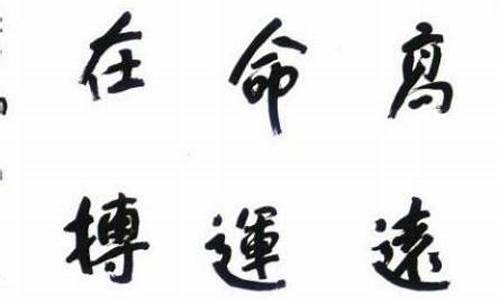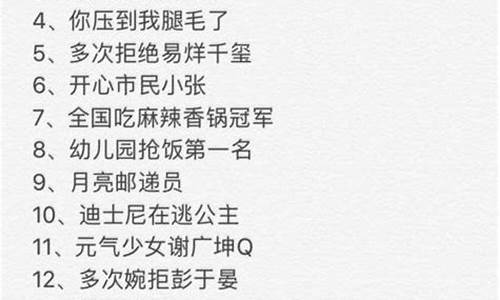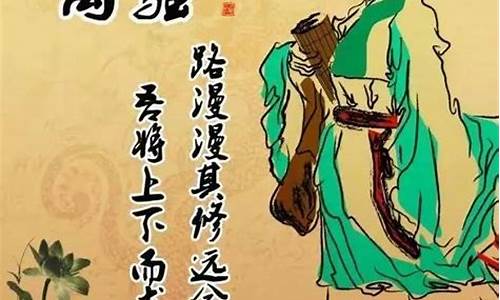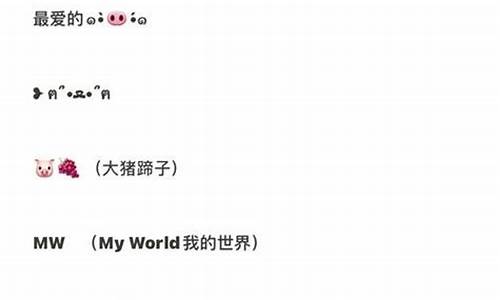您现在的位置是: 首页 > 搞笑语录 搞笑语录
六年级上册重点句子英语_六上册英语重点句子
tamoadmin 2024-09-08 人已围观
简介1.六年级英语上册第一单元知识点2.人教版小学六年级英语上册第一单元重点句子是哪些3.6年级上册英语全部的句子4.PEP六年级上学期英语单词句子(1_6单元全部)5.六年级上册英语第一单元四会单词和句子PEP六年级上册四会单词Unit 1:by (经……,乘……) foot(脚) bike(自行车) bus(公共汽车) train(火车) how(怎样) go to schoo
1.六年级英语上册第一单元知识点
2.人教版小学六年级英语上册第一单元重点句子是哪些
3.6年级上册英语全部的句子
4.PEP六年级上学期英语单词句子(1_6单元全部)
5.六年级上册英语第一单元四会单词和句子
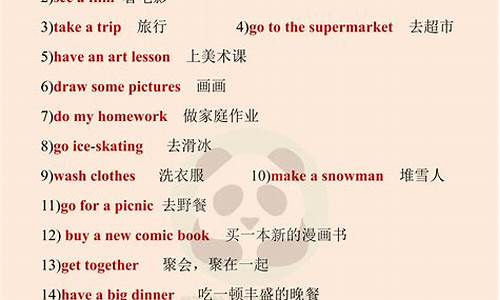
PEP六年级上册四会单词
Unit 1:by (经……,乘……) foot(脚) bike(自行车) bus(公共汽车) train(火车) how(怎样)
go to school(上学) traffic(交通) traffic light(交通灯) traffic rule(交通规则)
stop(停;停车站) wait(等;等待) get to(到达) by plane(乘飞机) by ship(乘轮船)
by subway(乘地铁)
Unit 2:library(图书馆) post office(邮局) hospital(医院) cinema(**院) bookstore(书店)turn(转弯) then(然后) where(在哪里,到哪里) please(请) next to(与……相邻) turn right (向右转) turn left(向左转) go straight(笔直走) north(北) south(南) east(东) west(西)
Unit 3:next week(下周) this morning(今天上午) this afternoon(今天下午) this evening (今天晚上) comic book(书) post card(明信片) newspaper(报纸) buy(购买)
Unit 4:hobby(爱好) ride a bike—riding a bike(骑自行车) play the violin—playing the violin(拉小提琴) dive—diving(跳水) make kites—making kites(制作风筝) collect stamps—collecting stamps(集邮) live—lives(居住) teach—teaches(教) go—goes(去) watch—watches(看) read—reads(读,看) does(助动词,无义) doesn’t=does not
Unit 5:singer(歌唱家,歌手) writer(作家) actor(男演员) actress(女演员) artist(画家)
TV reporter(电视台记者) engineer(工程师) accountant(会计) salesperson(销售员)
policeman(男警察) cleaner(清洁工) where(在哪里;到哪里) work(工作)
Unit 6:rain(雨;下雨) cloud (云;云彩) sun(太阳) stream((小)河;(小)溪) come from(来自……;从……来) seed() soil(土壤) sprout (苗;芽;嫩芽) plant(植物;种植) should (应该) then(然后)
PEP六年级上册三会单词
a pair of(一双) always(总是;一直)dictionary(词典;字典)magazine(杂志) tomorrow(明天)excuse me (对不起) fun(快乐;乐趣) go to the cinema(去看**) look(看上去) month(月份;月) read a magazine(阅读杂志) science museum(科学博物馆) shoe store(鞋店) show(展览;演出;表演;节目) take(乘坐) take a trip(去旅行) tell(告诉) tonight(今晚) vapour(蒸汽;水汽) want(想要)with(同……;和……) know(知道) minute(分钟) again(再一次;又;再)
PEP六年级上册四会句型
Unit 1
How do you go to school, Sarah? 萨拉,你怎样去上学?
Usually I go to school on foot. 通常我步行去上学。
Sometimes I go by bike.有时候,我骑自行车去。
How can I get to Zhongshan Park? 我怎样能到达中山公园?
You can go by the No.15 bus.你可以乘15路公交车去。
Unit 2
Where is the cinema, please? It’s next to the hospital.请问,**院在哪里?它与医院相邻。
Turn left at the cinema, then go straight. It’s on the left. 在**院处向左转,然后直行。它在左边。
Unit 3
What are you going to do on the weekend? 周末你打算干什么?
I’m going to visit my grandparents this weekend.这个周末我打算拜访我的祖父母。
Where are you going this afternoon? I’m going to the bookstore.今天下午你打算去哪里?我打算去书店。
What are you going to buy? 你打算买什么? I am going to buy a comic book.我打算买一本书。
Unit 4
What’s your hobby? 你的爱好是什么? I like collecting stamps. 我喜欢集邮。
He likes collecting stamps, too.他也喜欢集邮。
Does she teach English? No, she doesn’t. 她教英语吗?不,她不教。
Does she teach you math? Yes, she does. 她教你数学吗? 是的,她教数学。
Unit 5
What does your mother do?你的妈妈是干什么的? She is a TV reporter.她是一位电视工作者。
Where does she work?她在哪里上班? She works in a school.她在一所学校上班。
How does she go to work? 她怎样去上班?She goes to work by bus.她坐公交车去上班。
Unit 6
Where does the rain come from? It comes from the clouds.雨来自哪里? 它来自于云朵。
How do you do that? 你怎样做那件事呢?
What should you do then?接下来,你应该做什么呢?
PEP六年级上册三会句型
1. My home is near. 我的家很近。
2. What about you?你呢?
3. Look at the traffic lights.看交通灯。
4. Remember the traffic rules.记住交通规则。
5. Stop at a red light.红灯停。
6. Wait at a yellow light.黄灯等。
7. Go at a green light. 绿灯行。
8. Can I go on foot? Sure, if you like. It’s not far. 我能步行去嘛?当然,如果你喜欢。它不远。
9. Where is the …? It’s near the …
10. Excuse me, is there a … near here? Yes, there is.打扰一下,在这附近有没有一家…?是的,有。
11. Is it far from here? No, it’s not far.它离这儿远吗? 不,它不远。
12. –Thank you. –You’re welcome.谢谢,不客气。
13. Where is the …? …在哪里?
It’s east/west/south/north of the …它在…的东边,西边,南边,北边。
14. When are you going? I am going at 3 o’clock.你打算什么时候去?我打算3点钟去。
15. Can he go with us? Sure.他能和我们一起去嘛?当然。
16. Let’s go together.让我们一起去吧。
17. There is a stamp show on Sunday.在星期天,有一个邮票展。
18. She is a teacher. She teaches math.她是一位老师,她教数学。
19. Does your pen pal live in Shanghai?你的笔友住在上海吗?
No, he doesn’t. He lives in Beijing. 不,他不住上海。他住在北京。
20. Where does she work? She works in a car company.她在哪里上班?她在一家汽车公司上班。
21. How does she go to work? She goes to work by bus.她怎样去上班呢?她坐公交车去上班。
22. Where does the … come from? It comes from the … …来自于哪里?它来自于…
23. How can the water become vapour?水如何能变成蒸汽呢?
The sun shines and the water becomes vapour.在太阳的照射下,水就变成了蒸汽。
24. How do you do that?你怎样做那件事呢?
First, put the seeds in the soil.首先,把放进土壤里。
25. It’s easy.它很简单。
26. What should you do then?接下来你应该做什么呢?
Water them. In several days, you can see a sprout.给它们浇水,几天后,你就能看见一株幼苗。
27. First, …Then, …Next, …At last, …首先,然后,接下来,最后,
语法复习
一、现在进行时态(3种变化规律)
1. 直接加ing:do—doing draw—drawing cook—cooking answer—answering
read—reading listen—listening fly—flying sing—singing play—playing
2. 去掉末尾的e加ing:write—writing dance—dancing take—taking he—hing make—making ride—riding dive—diving
3. 双写末尾字母加ing: get—getting run—running swim—swimming sit—sitting
put—putting
你正在干什么? What are you doing? I’m answering the phone.
他/她/它正在干什么? What is he/she/it doing? He’s/She’s/It’s …
他(她、它)们正在干什么?What are they doing? They are …
看到like或likes后面的动词要加上ing
二、一般将来时态 (be going to/will + 动词原形)
表示一般将来时的时间状语有:this morning, this afternoon, this evening, tomorrow, tonight, this weekend, on the weekend, next week, next month, next year, next weekend.
(今晚)你将要做什么?What are you going to do (this evening)?
I’m going to the cinema.
I’m going to visit my grandparents.
你将什么时候去? When are you going?
I’m going at 7:10.
你将怎样去呢? How are you going?
I’m going by bus.
今天下午你将要去哪里?Where are you going this afternoon?
I’m going to the bookstore.
你将要买什么呢? What are you going to buy?
I’m going to buy a comic book.
你将和谁一起去? Who are you going with?
I’m going with my parents.
三、第三人称单数后面的动词要加s或es
1. 一般情况加s,如:read—reads;live—lives;play—plays;sing—sings
2. 动词末尾以s,x,ch,sh或部分以o结尾的加es。(记住课本中出现的这几个:watches, teaches, goes, does, washes, passes)
3. 辅音字母+y结尾的把y变i再加es,如:fly—flies;study—studies
4. 特殊情况:he--has
5. 第三人称单数包括:he; she; it; my father/friend; Amy/Hangzhou等一个人名或地名。
例如:
He likes drawing pictures.
She works in a car company.
It comes from the clouds.
My father goes to work on foot.
Li Lei often plays computer games after lunch.
6. 一般疑问句记住:前面助动词加了es,后面动词就不变化了。例如:
Does she teach English?
Does your pen pal live in Hangzhou?
四、不定冠词a和an的用法
a用于辅音因素开头的单词前;an用于元音因素开头的单词前。(a,e,i,o,u)
记住课本中出现的要用an的单词:an actor;an actress;an artist;an engineer;an accountant;an English book;an orange;an le;an old woman
五、动词变化为表示职业或人的单词
1. 动词后面加er:work—worker;teach—teacher;sing—singer;TV report—TV reporterclean—cleaner
2. 动词后面加or:act—actor;doctor
3. 末尾以e结尾的直接加r:write—writer;dance—dancer;drive—driver
4. 动词后面加ist:art—artist;tour—tourist
5. 职业男女有区别的:警察policeman—policewoman;演员actor—actress
六、8个疑问词
which (哪一个) what (什么) when (什么时候) where (哪里)
whose (谁的) why (为什么) how (怎么样) who (谁)
七、人称代词和物主代词
I—my(我—我的) you—your(你;你们—你的;你们的) he—his(他—他的) she—her(她—她的) we—our(我们—我们的) they—their(他们/她们/它们—他们的/她们的/它们的)
八、can后面加动词原形
What can you do?
I can cook the meals.
He can fly kites.
She can play the violin.
六年级英语上册第一单元知识点
牛津小学英语牛津小学英语牛津小学英语牛津小学英语6666AAAA第第第第三三三三单元知识点整理及要求单元知识点整理及要求单元知识点整理及要求单元知识点整理及要求((((二二二二)))) 三三三三、、、、熟读本课课文熟读本课课文熟读本课课文熟读本课课文、、、、能够理解运用部分重点句型能够理解运用部分重点句型能够理解运用部分重点句型能够理解运用部分重点句型。。。。 1所有的学生都非常兴奋激动。 All the students are very excited. 2她正在寻找她的照相机。 She is looking for her camera. 3男孩们正在跑步。 The boys are running now. 4让我拍一些照片吧。 Let me take some photos. 5我的照相机在哪?它在你的包里。 Where’s my camera? It’s in your bag. 6它刚才在那里;它们刚才在这儿。 It was there a moment ago. They were here just now. 7你能帮我把它们捡起来吗? Can you pick them up for me please? 四四四四、、、、初步理解掌握本课语法知识初步理解掌握本课语法知识初步理解掌握本课语法知识初步理解掌握本课语法知识。。。。 一般过去时一般过去时一般过去时一般过去时::::简单地说是表示过去发生的简单地说是表示过去发生的简单地说是表示过去发生的简单地说是表示过去发生的动作或存在的状态动作或存在的状态动作或存在的状态动作或存在的状态。。。。一般来说一般来说一般来说一般来说,,,,句子中句子中句子中句子中just now, a moment ago, last就要用一般过去时就要用一般过去时就要用一般过去时就要用一般过去时。。。。 Be动词的一般过去时 ((((一一一一))))陈述句陈述句陈述句陈述句: 1.I was a teacher two years ago.两年前我是一个老师。 2.He was a doctor last year.去年他是一个医生。 3.We were in the computer room just now.刚才我们在电脑房。 4.They were in the table tennis room just now.刚才他们在乒乓球室。 ((((二二二二))))否定句否定句否定句否定句:(:(:(:(在在在在was/were后加后加后加后加not即可即可即可即可)))) 1.I wasn’t a teacher two years ago.两年前我不是一个老师。 2.He wasn’t a doctor last year.去年他不是一个医生。 3.We weren’t in the computer room just now.刚才我们不在电脑房。 ((((三三三三))))一般疑问句及回答一般疑问句及回答一般疑问句及回答一般疑问句及回答::::(将将将将was, were提前即可提前即可提前即可提前即可,,,,也就是也就是也就是也就是Was/Were+ …) 1.Was he a doctor last year? Yes, he was. /No, he wasn’t.去年他是一个医生吗?是的,他是。/不,他不是。 2.Was she a driver three years ago? Yes, she was. /No, she wasn’t.三年前她是一个司机吗?是的,她是。/不,她不是。 wasn’t.昨晚你在家吗?是的,我在。/不,我不在。 3.Were you at home last night? Yes, we were. /No, we weren’t.昨晚你们在家吗?是的,我们在。/不,我们不在。 ((((四四四四))))特殊疑问句及回答特殊疑问句及回答特殊疑问句及回答特殊疑问句及回答::::(特殊疑问词特殊疑问词特殊疑问词特殊疑问词+was/were+…) 1.Where was he a moment ago? He was in the toilet.片刻之前他在哪?他在厕所。 2.Where was the dog just now? It was in the garden.刚才这只狗在哪?它在花园。 3.Where were they last night? They were at school.昨晚他们在哪?他们在学校。
希望能帮到您,谢谢!!望纳!!(*^__^*) 嘻嘻……!祝你学习快乐!!
人教版小学六年级英语上册第一单元重点句子是哪些
为您整理了:六年级英语上册第一单元知识点欢迎大家阅读愉快!
六年级英语上册第一单元知识点
一、主要单词:
Planeshipsubwaybyfootbikebustrainhowtrafficstopwaitknow
二、主要词组:
byplane坐飞机byship坐轮船onfoot步行bybike骑自行车bybus坐公共汽车
bytrain坐火车trafficlights交通灯trafficrules交通规则
Stopataredlight红灯停Waitatayellowlight黄灯等Goatagreenlight绿灯行gotoschool去上学getto到达
三、主要句子:
Howdoyougotoschool?你怎么去上学?
UsuallyIgotoschoolonfoot.SometimesIgobybus.通常我步行去上学。有时候骑自行车去。
HowcanIgettoZhongshanPark?我怎么到达中山公园?
YoucangobytheNo.15bus.你可以坐15路公共汽车去。
四、知识点:
1、Therearemanywaystogosomewhere.到一个地方去有许多方法。
这里的ways一定要用复数。因为thereare是Therebe句型的复数形式(就近原则—主谓一致)。
2、get相关的短语:
getto到达
geton上车
getoff下车
3、onfoot步行乘坐其他交通工具大都可以用介词by,但是步行只能用介词on。
例:bybike,bybus
4、gotoschool(去上学)的前面绝对不能加the,这里是固定搭配。
5、USA=US=America美国
6、gotothepark前面一定要加the.
如果要去的地方有具体的名字,就不能再加the;如果要去的地方没有具体名字,都要在前面加the.(gotoschool除外。)
7、Howdoyougoto…?你怎样到达某个地方?如果要问的'是第三人称单数,则要用:Howdoeshe/she…goto…?
例:Howdoyougotoschool?你怎么去上学?
8、反义词:
geton(上车)---getoff(下车)near(近的)—far(远的)fast(快的)—slow(慢的)
because(因为)—why(为什么)same(相同的)—different(不同的)
9、近义词:
seeyou---goodbyesure---certainly---ofcourse
10、频度副词:
always总是,一直usually通常often经常sometimes有时候never从来不
11、Thetrafficlightsarethesameineverycountry.Therearealwaysthreelights:red,yellowandgreen.每个国家的交通灯是一样。总是有三种:红,黄,绿。
12、China/US(中国和美国):therightsideoftheroad右边(沿道路右边走)
England/Australia(英国和澳大利亚):theleftsideoftheroad左边(沿道路左边走)
相关信息:
六年级第四单元重要单词和句子:Unit4
6年级上册英语全部的句子
母亲节不言感恩
(片断)妈妈生养我,是一种义务,是必需,是妈妈生存的价值,所以无所谓大恩大德——妈妈曾经这样对我说,我也这样认为.
但是,在母亲节那一天,我仍旧要买一束康乃馨送给妈妈,祝福妈妈安康快乐.这不是感恩,而是在传递亲情.我不感谢妈妈的恩情,但我珍重妈妈给予我的亲情;妈妈不期盼我的感恩,但妈妈期盼亲情的往来.传递亲情就是传递温暖.被亲情温暖的人心最柔软,所以妈妈手捧康乃馨眼含幸福的泪花,而我也被妈妈的感动而感动……
评价:我想,每一个同学都是有自己的思想的,因为 “每人一颗脑袋”.但是,现在有越来越多的同学不善于用自己的语文表达自己的思想,所以在作文中总是让自己思想努力贴近公共思维——面对母亲的爱,要感恩,而且必需要感恩,这就是公共思维.因此,一有“感恩”类的作文题目时,大家就纷纷表达“意志相同的公共声音”,作文的价值取向“千文一面”.
PEP六年级上学期英语单词句子(1_6单元全部)
一、
1、Where?is?the?cinema?**院在哪?
2、It?‘s?next?to?the?bookstore.?它紧邻书店。
3、How?can?I?get?there?我怎样到那儿?
4、Turn?left?at?the?bookstore.?在书店左转
5、Turn?right?at?the?hospital.?在医院右转
6、Is?it?far?那?儿?远?吗?
7、No,it?’?s?near.?不,它很近
二、
1、Ways?to?go?to?school.?去上学的方式。
2、Stop?and?wait?at?a?red?light.?红灯停下等待
3、Slow?down?and?stop?at?a?yellow?light.?黄灯减速停下。
4、Go?at?a?green?light.?绿灯行。
5、How?do?you?go?to?school?你怎么去学校的?
6、Usually,?I?go?on?foot.?通常我走路去
7、In?the?USA?people?on?bikes?must?wear?one.?在美国必须戴(头盔)
8、Don't?go?at?the?red?light!?别闯红灯
9、I?must?pay?attention?to?the?traffic?lights!?我必须注意交通信号灯
三、
1、My?weekend?plan.?我的?周末。
2、visit?my?grandparents?拜访我的祖父母
3、go?to?the?supermarket?去超市
4、What?are?you?going?to?do?tomorrow?你明天打算做什么?
5、I'm?going?to?he?an?English?lesson.?我要上美术课。
6、We're?going?to?cook?in?Renmin?Park.?我们要到人民公园野炊
7、Where?are?you?going?你们打算去哪儿?
8、We're?going?to?the?cinema.?我们打算去**院。
9、When?are?you?going?你们什么时候去?
四、
1、What?are?your?hobbies?你有什么爱好?
2、What?are?Peter's?hobbies?彼得有什么爱好?
3、He?likes?reading?stories.?他喜欢读故事。
4、Does he live in China? 他住在中国吗?
5、No,?he?doesn't.?不,他不在
6、Does?he?like?doing?word?puzzles?and?going hiking?他喜欢猜字谜和远足吗?
7、Yes,?he?does.?是的,他喜欢
五、
1、What?does?he?do?他是干什么工作的?
2、He?is?a?student.?他是一个学生
3、He's?a?businessman.?他是个商人
4、Where?does?he?work?他在哪儿工作?
5、He?works?at?sea.?他在海上工作
6、How?does?he?go?to?work?他怎么上班?
7、He goes to work
3by bike . 他骑自行车上班
六、
1、How?do?you?feel?你感觉怎么样
2、What's?wrong?怎么了?
3、I?am?hy.?我很高兴
4、He?is?sad.?他很难过
5、She?is?angry.?她很生气
6、We?are?worried.?我们很担心
7、Your?father?is?ill.?你爸爸病了
8、He?should?see?a?doctor?this?morning.?他今天早上应该去看病
9、Don't?be?sad.?别伤心
10、Don't?worry.?别担心
11、They?are?afraid?of?him.?他们怕他
12、The?cat?is?angry?.?这只猫很生气
六年级上册英语第一单元四会单词和句子
小学英语六年级(PEP)(上)四会、三会、二会单词及重点句型
四会(听、说、读、写)单词
by (经,乘), foot(脚), bike(自行车) ,bus(公共汽车) ,train(火车) ,how(怎样), go to school(上学), traffic(交通), traffic light(交通灯), traffic rule(交通规则), stop(停,停车站),wait(等待), get to(到达),
library(图书馆), post office(邮局), hospital(医院), cinema(**院), bookstore(书店), where(在哪里,到哪里), please(请), next to(与…相邻), turn(转弯) ,right (右边), left(左边), straight(成直线地), then (然后),
next week(下周), this morning(今天上午), this afternoon(今天下午), this evening (今天晚上), comic book(书), post card(明信片), newspaper(报纸), buy(购买),
hobby(爱好), ride a bike--riding a bike(骑自行车), dive--diving(跳水), play the violin—playing the violin(拉小提琴), make kites—making kites(制作风筝), collect stamps—collecting stamps(集邮), live–lives(居住), teach--teaches(教) go--goes(去), watch--watches(看), read--reads(读,看), does doesn’t=does not,
singer(歌唱家,歌手), writer(作家) ,actor(男演员),actress(女演员), artist(画家), TV reporter(电视台记者), engineer(工程师) ,accountant(会计), policeman(男警察), salesperson(销售员) ,cleaner(清洁工), work(工作),rain(雨), cloud (云), sun(太阳), stream(河,溪), come from(来自,从…来), seed(), soil(土壤) ,sprout (苗,芽) ,plant(植物,种植), should (应该), then(然后)
三会(听、说、认读)单词
plane飞机 ship船舰 subway地铁 then然后 always总是,一直 know知道 science museum
科学博物馆 excuse me对不起,打扰一下 want想要 a pair of一双 minute分钟 North北 South南 West西 East东 tell告诉 take乘坐
tonight今晚 tomorrow明天 take a trip去旅行 read a magazine阅读杂志go to the cinema去看** magazine杂志 dictionary词典、字典 shoe store鞋店fun快乐、乐趣 with同…/和…. Show展览、演出 vapour蒸汽、水汽 again再一次、又、再
二会(听、说)单词
fifth第五remember记住 find寻找、找到difference不同、区别 same相同的every每个、所有的country国家 mean意思是drive驾驶 right右边的 side边 England英格兰Australia澳大利亚however但是left左边的if如果must必须far远supermarket超市bank银行after在…之后school学校buy购买shoe鞋store商店get off下车twelfth第十二 party聚会start开始look for寻找 theme part主题公园the Great Wall长城busy忙碌的 together一起地fruit stand水果摊 pet shop宠物商店need需要plant植物else其他的shop商店 pen pal笔友dear亲爱的twin双胞胎(之一)something某事物must必须、一定、肯定TV reporter电视台记者different不同的week星期、周say说soon不久excited兴奋的、激动的Hongkong香港company公司factory工厂design设计tip有用的建议、使用的小提示help帮助money钱well好、对、满意地enjoy从…获得乐趣tourist旅行者、旅游者、观光客way道路motor cycle摩托车police警方、警察部门shine照耀become成为little小的drop水珠wake up醒来feel感觉、感到think想、思考meet遇见、碰见high高other其他的、另外的、别的fall down落下、跌落、降落、从高到低、向下into进入到…里面come out露出、出现garden花园easy简单的put放several一些(但不多)几个day天see看见pot锅、碗、瓢、盆lovely可爱的、美丽的get得到old(某)年龄make sure核实或查明某事物mouth嘴still仍然、依旧、还是come on加油ardly几乎没有,几乎不
重点句型:
How do you go to school, Sarah? Sarah,你怎样去上学?
Usually I go to school on foot. Sometimes I go by bike.
通常我步行去上学,有时我骑自行车去。
How can I get to Zhongshan Park? You can go by the No.15 bus.
我这样才能达到中山公园?你可以乘15路公共汽车去。
Stop at a red light Wait at a yellow light Go at a green light 红灯停,黄灯等,绿灯行。
Where is the cinema, please? It’s next to the hospital. 请问6 **院在哪? 它在医院旁边。
Turn left at the cinema, then go straight. It’s on the left.
在**院旁左转,然后直走,它就在左边。
What are you going to do on the weekend? 周末你打算干什么?
I’m going to visit my grandparents this weekend. 这个周末我打算去看望我的(外)祖父母。
Where are you going this afternoon? I’m going to the bookstore.
今天下午你打算去哪里?我打算去书店。
What are you going to buy? I am going to buy a comic book.
你打算买什么?我打算买一本书。
What’s your hobby? I like collecting stamps. 你的爱好是什么?我喜欢集邮。
My hobby is collecting stamps. 我的爱好是集邮。
He likes collecting stamps, too. 他也喜欢集邮。
Does she teach English? No, she doesn’t. 她教英语吗?不是。
Does she teach your math? Yes, she does. 她教你数学吗?是的。
What does your mother do? She is a TV reporter.
你妈妈是干什么的?她是一名电视台记者。
Where does she work? She works in a school. 她在哪里上班?她在一所学校上班。
How does she go to work? She goes to work by bus. 她怎样去上班?她乘公共汽车去上班
Where does the rain come from? It comes from the clouds. 雨来自哪里?它来自云。
How do you do that? 你怎样做呢?
What should you do then? 然后你该怎样做?
语法:
请复习名词的复数 be动词的用法, do、does的用法,some、any的用法, where 、what、 when、 how 的用法, 一般疑问句的用法, 动词ing形式, 第三人称单数式
希望可以帮到你!
by plane飞机BY SHIP船;轮船ON FOOT走路BY BIKE骑车BY BUS公共汽车BY TRAIN火车BY SUBWAY地铁TRAFFIC LIGHT交通灯TRAFFIC RULES交通规则STOP停WAIT等待
How do you go to school,Sarah?
Usually i go to school on foot.
Sometime i go by bike.
How can i get to Zhongshan Park?
You can go by the NO.15 bus.

